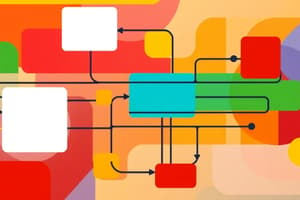Podcast
Questions and Answers
What are the primary components of a distributed system?
What are the primary components of a distributed system?
- Applications, Frameworks for distributed programming, Hardware, and Operating System
- Networking, Middleware, Client/Server architecture, and Messaging protocols
- Operating System, IPC primitives, Middleware, and Hardware (correct)
- Database management, User interfaces, Frameworks for distributed programming, and Servers
Which of the following is NOT an example of a distributed system?
Which of the following is NOT an example of a distributed system?
- Manufacturing and process control
- Single-user desktop applications (correct)
- Banking systems
- Federated Databases
What is a key characteristic of the Client/Server system architectural style?
What is a key characteristic of the Client/Server system architectural style?
- Resources and services are distributed equally among clients.
- Information and services are centralized on a single access point. (correct)
- All clients share the same user interface.
- Clients operate independently without server interaction.
In the context of distributed systems, what does Middleware primarily facilitate?
In the context of distributed systems, what does Middleware primarily facilitate?
Which of the following includes a communication model relevant to distributed systems?
Which of the following includes a communication model relevant to distributed systems?
What is the primary role of the server process in distributed object frameworks?
What is the primary role of the server process in distributed object frameworks?
In the context of remote procedure calls, what does RPC primarily extend?
In the context of remote procedure calls, what does RPC primarily extend?
What is the significance of the interface definition in distributed object frameworks?
What is the significance of the interface definition in distributed object frameworks?
Which mechanism allows clients to obtain references to active remote objects in distributed object frameworks?
Which mechanism allows clients to obtain references to active remote objects in distributed object frameworks?
What is a key characteristic of Service-Oriented Architecture (SOA)?
What is a key characteristic of Service-Oriented Architecture (SOA)?
Flashcards are hidden until you start studying
Study Notes
Distributed System Communication
- Components communicate through message passing, which includes various communication models.
Components of a Distributed System
- Applications: End-user software that relies on distributed resources.
- Frameworks: Tools for distributed programming to simplify development.
- Middleware: Software layer that facilitates communication and data management.
- IPC Primitives: Interprocess communication tools for data control.
- Operating System: Manages hardware and software resources.
- Networking and Parallel Hardware: Infrastructure for data exchange and processing.
Examples of Distributed Systems
- Banking Systems: Handle transactions across multiple locations.
- Communication: Email services facilitating message exchange.
- Distributed Information Systems: Includes the World Wide Web and federated databases.
- Manufacturing Control: Systems for managing production processes.
- Inventory Systems: Track goods and supplies across various locations.
- General Purpose Applications: Used in educational institutions or office automation.
System Architectural Styles
- Client/Server Model: Centralizes information and services at a server accessed by multiple clients for resource efficiency.
- Distributed Object Frameworks: Employs Remote Procedure Calls (RPC) for method invocations across networks. Key implementations include:
- CORBA: Common Object Request Broker Architecture.
- DCOM/COM+: Distributed Component Object Model.
- RMI: Remote Method Invocation.
- .NET Remoting: Allows .NET components to communicate across application domains.
- Service Oriented Architecture: Utilizes web services for interaction between disparate services.
Remote Procedure Call (RPC)
- Extends procedure calls beyond a single process and memory space, enabling interaction between procedures on the same or different systems.
Distributed Object Frameworks
- Extend object-oriented programming by allowing distribution across networks, while maintaining coherent operations.
- Server Process: Maintains a registry of active objects for client access.
- Client Process: Obtains references to remote active objects and invokes methods through these references, with parameters marshaled like in RPC.
Types of Web Services
-
SOAP Web Services:
- Based on the Simple Object Access Protocol, fully XML-based.
- Utilizes SOAP envelopes for secure communication.
- Standardized by W3C for greater security.
-
Restful Web Services:
- Architectural style rather than a protocol.
- Treats resources as identifiable entities with unique URIs.
- Supports diverse data formats, including XML and JSON.
Key Components of SOAP Web Services
- XML: Standard for data representation and exchange.
- SOAP: Protocol for structured message exchange.
- UDDI: Universal Description, Discovery, and Integration for locating web services.
- WSDL: Web Services Description Language, detailing service interfaces.
- Example Implementation: A buyer links to a seller service via UDDI, with service definitions provided by WSDL.
Studying That Suits You
Use AI to generate personalized quizzes and flashcards to suit your learning preferences.




